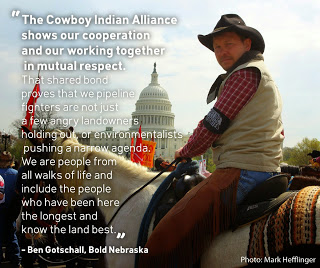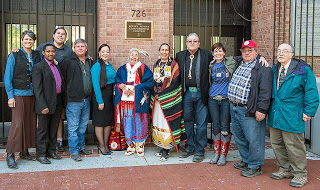 The Cowboy Indian Alliance, a partnership of farmers, ranchers and tribal communities, rode into Washington, D.C., on April 22 to call on President Obama to reject the Keystone XL Pipeline. Farm Aid signed on to the protest of the pipeline, which, if approved, would carry tar sands oil from Canada to refineries in Texas, cutting through family farms and ranches in Montana, South Dakota and Nebraska. The proposed route also crosses the Ogallala Aquifer, a shallow water resource that underlies eight states and supplies essential irrigation and drinking water to the Great Plains.
The Cowboy Indian Alliance, a partnership of farmers, ranchers and tribal communities, rode into Washington, D.C., on April 22 to call on President Obama to reject the Keystone XL Pipeline. Farm Aid signed on to the protest of the pipeline, which, if approved, would carry tar sands oil from Canada to refineries in Texas, cutting through family farms and ranches in Montana, South Dakota and Nebraska. The proposed route also crosses the Ogallala Aquifer, a shallow water resource that underlies eight states and supplies essential irrigation and drinking water to the Great Plains.
Farm Aid awarded Farmer Leadership Grants to offset travel costs for Nebraska farmers and ranchers attending the six-day Reject and Protect event in Washington, D.C.
In a statement, Farm Aid lent its support to the farmers and ranchers fighting the Keystone XL Pipeline:
“Family farmers and ranchers are stewards of the soil and water. These family farmers and ranchers are sacrificing precious time during planting season to protest the pipeline because they are stewards of the land. They work the land every day and they know its needs and vulnerabilities. They know the benefits the land brings to all of us when it is cared for and they know what’s at stake when it is not.
“At Farm Aid, we’ve heard directly from family farmers whose farms lie in the proposed path of the Keystone XL Pipeline. Many of these farms have been in the same family for generations. Now the Keystone XL Pipeline jeopardizes the health and viability of that land, rather than ensuring its health for future generations.
“The proposed path of the Keystone XL Pipeline could also have grave implications for the Ogallala Aquifer. This water source, which makes farming possible in the Great Plains, is too precious to risk damage by tar sands oil spills. Crops and livestock, farmer livelihoods, and communities that depend on the Ogallala for drinking water are all at stake.
“To take farmland from families who have cared for it for generations is not in the public’s interest. And during a time of persistent and chronic drought, putting the Great Plains’ most precious water source at risk is unconscionable.
“The United States needs a comprehensive energy policy that supports a diversity of homegrown energy alternatives that generate jobs, benefit rural communities and protect our precious environmental resources. Family farmers and ranchers are part of the solution and are integral to establishing America’s clean energy future.”
Members of the Cowboy and Indian Alliance before their meeting with White House officials on Wednesday, April 24, 2014.



